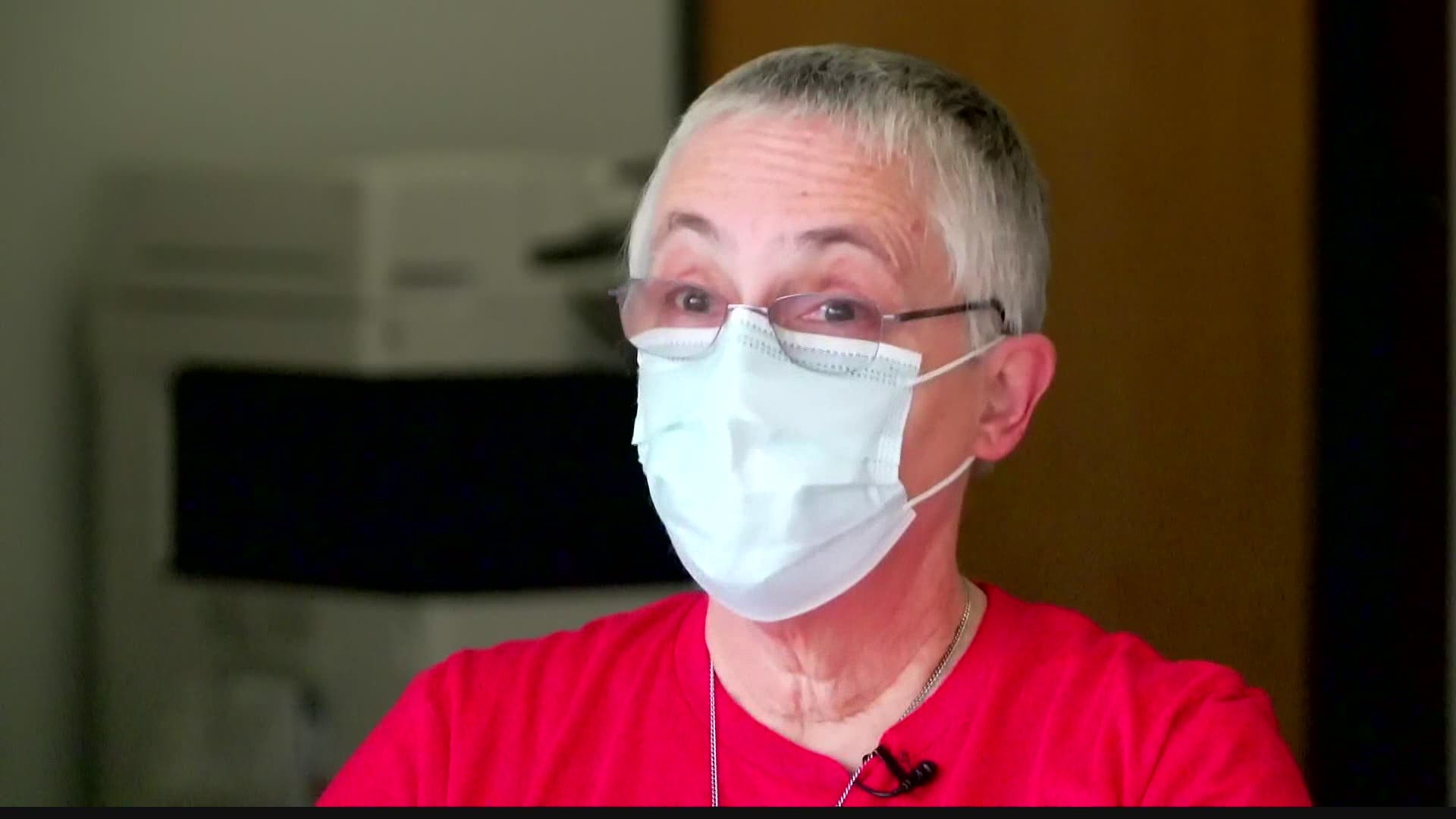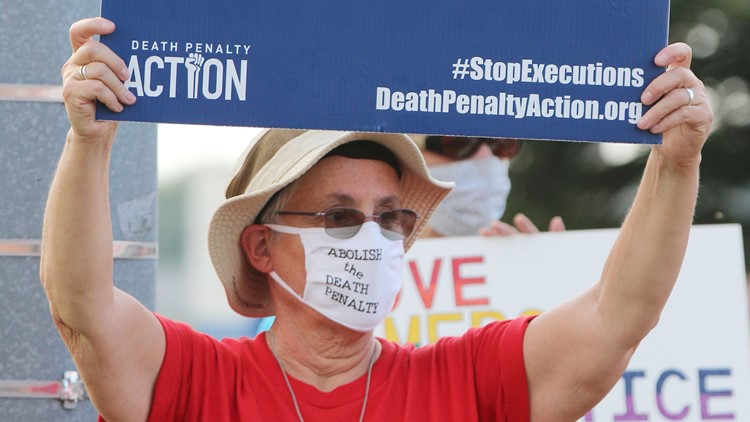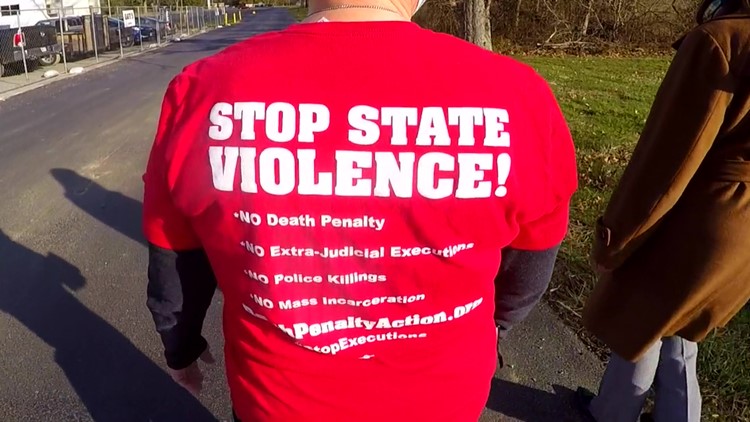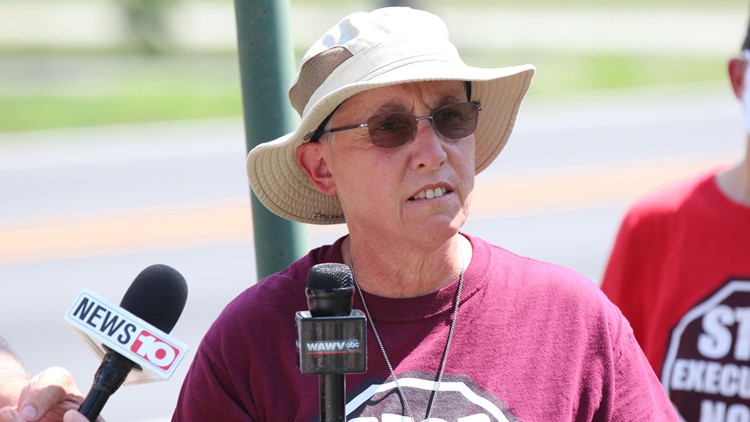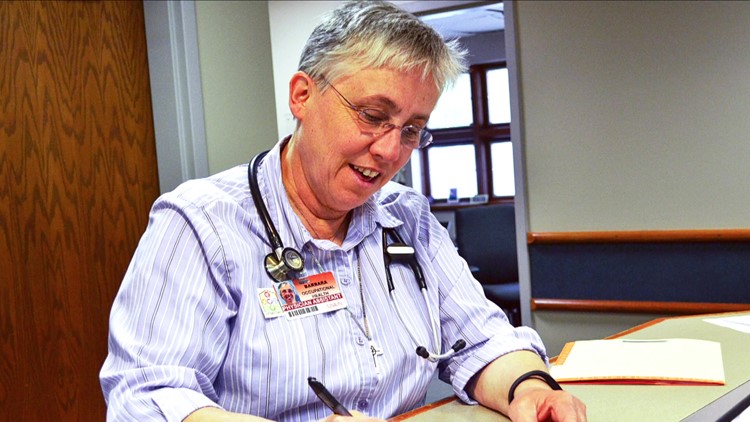TERRE HAUTE, Ind. — The sprawling St. Mary-of-the-Woods campus, home to the Sisters of Providence, is quiet and peaceful, especially being winter break.
You do hear the bells of the Church of the Immaculate Conception. They ring every half hour. But the bells also toll every time a death row inmate is executed ten miles away at the U.S. Penitentiary in Terre Haute, Ind.
The bells have tolled ten times since mid-July when President Trump ordered executions to resume at the federal prison after a 17-year hiatus.
Sister Barbara Battista calls the toll a solemn recognition.
She stood outside the prison for protests and vigils and she stood inside twice as two inmates she became spiritual advisor to were executed.
"You go from he's alert, talking to you and then he's made to be quiet," she said. "Within minutes he takes his last breath."
Battista is fervent opponent of the death penalty. The red shirt she wore the day we met says, "Stop Executions Now!" on the front and "Stop State Violence!" on the back.
She said she's been adamant about the death penalty most of her adult life, and long before the Vatican deemed it "an attack on the inviolability and dignity of the person" and "inadmissible" in all cases.
"This is a human life and who are we to decide this person deserves to be killed?" she asked. "Who are we to say this person is beyond redemption?"
Who is Sister Barbara Battista?
Sister Barbara Battista
Batista, 63, grew up in Indianapolis attending Catholic schools, but it wasn't until later she was called to religious life.
She joined the Sisters of Providence, taking her initial vows in 1985. She spent most of her ministry as a physician's assistant working first at a hospital in Chicago and later in Terre Haute. Two years ago, she became the order's "Justice Promoter."
Her job is to speak out on behalf of issues like racial justice, immigration reform and abolishing the death penalty.
When the president announced plans to resume federal executions, it became a key focus. Her work soon involved more than standing outside the prison with fellow protestors.
Becoming a spiritual companion

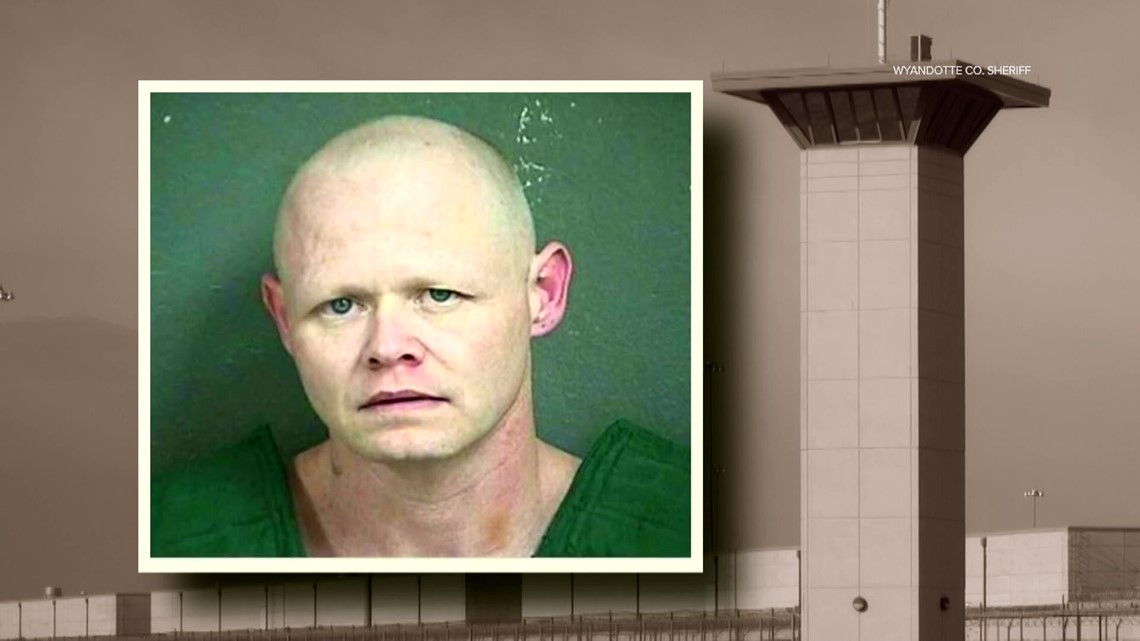
On July 7, Battista received a request be a spiritual companion for a death row inmate named Keith Dwayne Nelson. Inmates wanting a spiritual advisor must choose one who shares their religious affiliation. Battista didn't know Nelson, but she'd been recommended.
The call came the night she learned her oldest brother had died in a car accident. She was overcome with grief.
"And still, when a person asks me to be with him while he's being killed I couldn't say no," she said. "I didn't want to say no,"
Nelson was sentenced to death for the 1999 kidnapping, rape and killing of a 10-year-old Missouri girl. He and Battista met once inside the prison with a glass partition between them because of COVID-19. After that meeting, they talked on the phone several times over the next seven weeks but never about the crime.
"I wasn't there to guide questions or the conversation." she said. "I felt my role was to be there for him."
She said he talked about his father, life on the "row," his daily routine, but not much about his impending death. Battista asked if he'd have any last words.
"He was very clear that to him the process is all theater," she said. "There was nothing he could say that would make anyone think any more of him because he was a condemned man."
On the afternoon of August 28, the warden led Battista to a small, heavily-secured building surrounded by what she described as privacy curtains and fencing and into the execution chamber. She said Nelson was strapped to a table covered with a sheet from his chin past his feet.
She said an executioner was on one side at his left shoulder and a U.S. Marshal on his right. Nelson was stretched out with his arms out, "forming the shape of a cross."
She said her goal was to focus on Nelson and, "just connect with him emotionally through the energy in the room."
Roughly nine minutes after the lethal injection was inserted, Nelson was pronounced dead.
Encounters with death are not unusual for Sister Barbara. She has been with patients and sisters at the Mother House as they've died.
"It's quiet, solemn and for the most part peaceful," she said. "You're reaching out, keeping them comfortable and the timing is out of your control. This felt so different. For one, this man had a date with death and he knew the hour he would be killed."
Another request

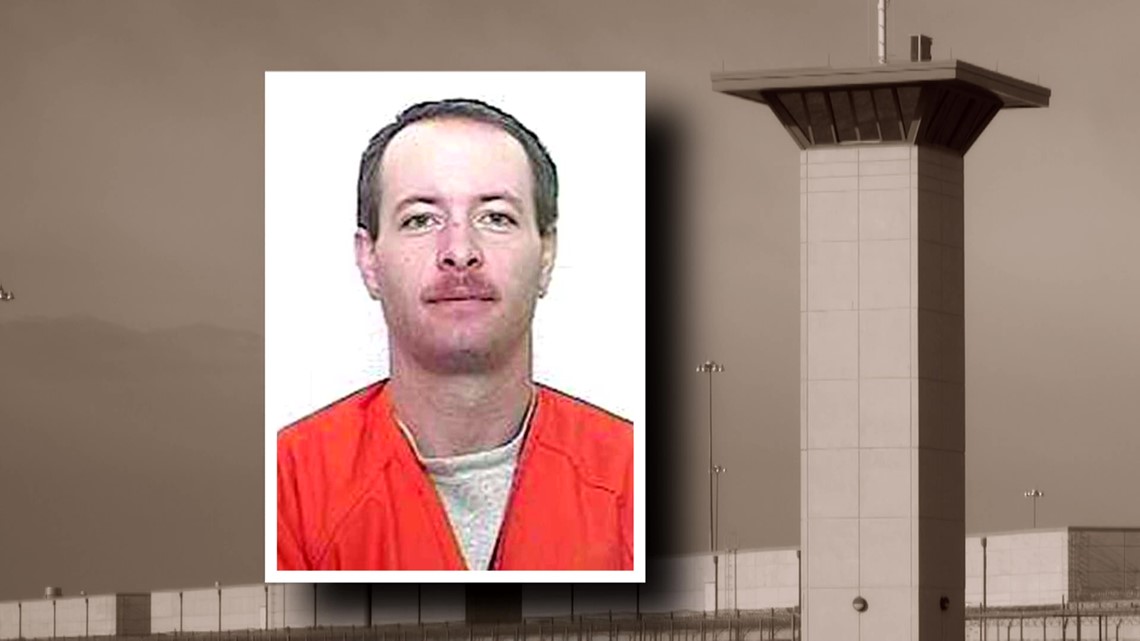
Soon after Nelson's execution, Battista received another request. William LeCroy requested her as his spiritual advisor leading up to his execution in September. LeCroy was sentenced to death in the rape and stabbing death of a Georgia nurse 19 years ago.
"He did not claim to be innocent," Battista said, adding she was there to listen and let him direct the conversation.
She said LeCroy told her he spent most of his time immersed in books, studying and developing a spiritual life. He quoted from Thomas Merton and William Shakespeare while speaking to her.
Like the others on death row, he was confined to his cell 23 hours a day.
She said he too decided not to share any final words before he was executed.
"He said, 'No matter what I say, if I say I'm sorry, they'll say I'm not sincere. It's a no-win situation,'" she recalled.
He did ask her to pray for and with him during his execution. He asked her to pray the Divine Mercy Chaplet, which Battista described as "a plea, a prayer. It's a seeking mercy on the world not just for himself."
On Tuesday, September 22, Battista returned to the U.S. Penitentiary and was once again escorted to the execution chamber where LeCroy was strapped down.
She said, like Nelson, LeCroy "seemed resigned and not at all anxious, pretty much like this is the way it is."
Battista held a prayer book in her hand and began softly reciting the Divine Mercy Chaplet.
"He had asked me to keep praying it and to pray it out loud with him," she said.
While he didn't share any final words, he had mailed Battista a two-page, handwritten letter that arrived after his execution.
She said it talked about, in part, his violent childhood and what that does to a person.
Debate over capital punishment

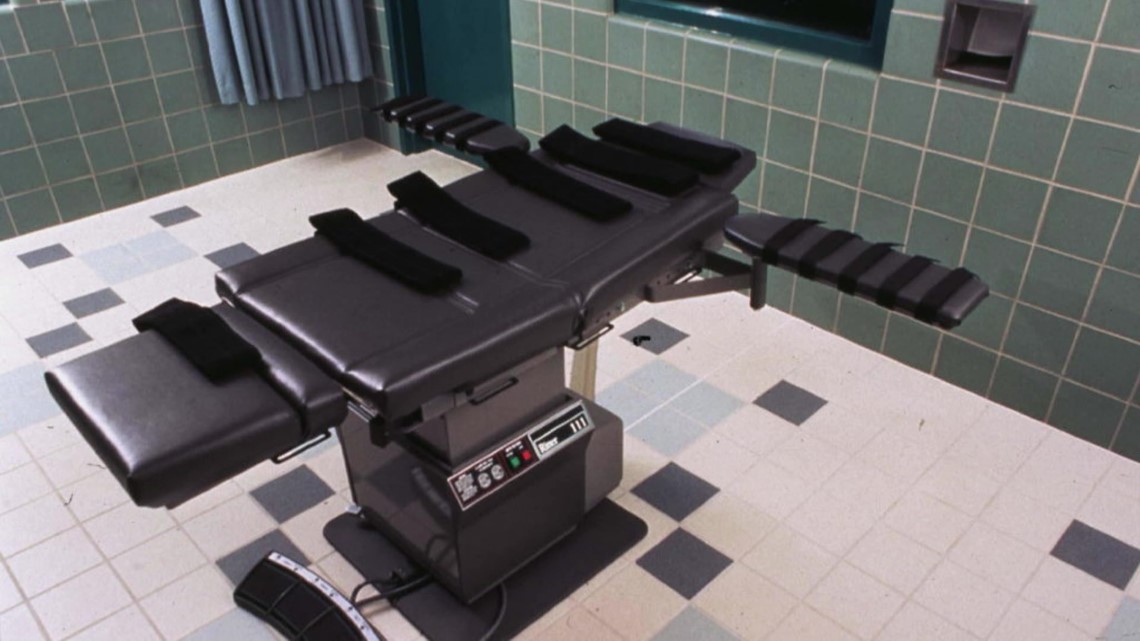
Battista knows a lot of people feel differently about the death penalty and her ministry to those on death row,
After LeCroy's execution, she said she received a call from a friend of the victim's family who was trying to sincerely understand how she could be so kind and loving to a convicted murderer and be willing to speak about his humanity.
"She wasn't disrespectful but very adamant and intense in her conversation," Battista said. "She felt like if I really knew what he had done, I would not have been able to do what I did."
Battista said she prays and feels for everyone affected, the victims and their families, the condemned and their loved ones along with the Bureau of Prison staff who are doing their jobs.
She said the crimes of the guilty don't justify more death.
"These people have done terrible things, horrendous, awful, and life in prison is punishment, plenty of punishment," Battista said. "There is no reason why a civilized society should say it's okay to kill someone that killed someone to prove that killing is wrong."
Sister Battista also pointed out the system is not foolproof. There have been 172 exonerations from death row since 1973. She said, "If we can't get it 100% right, no government or human being should have the power to take another person's life without consequences."
Back on the St Mary-of-the-Woods campus, the bells are expected to toll at least three more times before president-elect Joe Biden is sworn in on January 20. That will bring the total to 13 executions over a six-month period, the highest number since 1896 when it reached 14.

